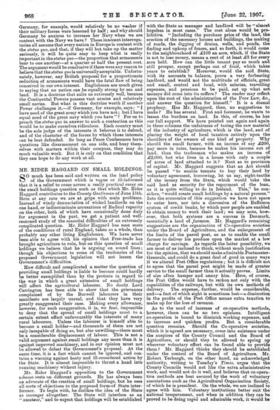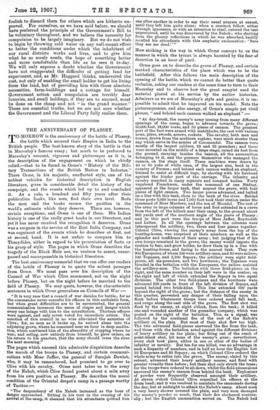MR. RIDER HAGGARD ON SMALL HOLDINGS.
Q0 much has been said and written on the land policy of the Government which is vague or ill-informed that it is a relief to come across a really practical essay on the small holdings question such as that which Mr. Rider Haggard contributes to the County Gentleman of June 15th. Here at any rate we are at grips with main problems. Instead of windy denunciation of wicked landlords on the one hand, or indiscriminate accusations of Radical rapacity on the other, both of which have occasionally done duty for argument in the past, we get a patient and well- reasoned study of the essential difficulties of an extremely complicated question. Mr. Rider Haggard has seen more of the conditions of rural England, taken as a whole, than probably any other living Englishman. We have never been able to agree with his opinion that Free-trade has brought agriculture to ruin, but on this question of small holdings we believe that he is arguing on sound lines ; though his objections to some of the tendencies of the proposed Government legislation will not lessen the Government's difficulties.
How difficult and complicated a matter the question of providing small holdings is liable to become could hardly be better. exemplified than by the protests in regard to the way in which a great extension of small holdings will affect the agricultural labourer. No doubt Lord Carrington has been able to show that the grievances complained of by the Burwell labourers in their manifesto are largely unreal, and that they have very greatly exaggerated their case. Making every allowance, however, for such exaggeration, it is, we fear, impossible to deny that the spread of small holdings must to a certain extent affect unfavourably the interests of many rural labourers. Unless the labourer is himself able to become a small holder—and thousands of them are not only incapable of doing so, but also unwilling—there must be a considerable displacement of labour. This is not a valid argument against small holdings any more than it is against improved machinery, and in our opinion must not be allowed to defeat the Government's proposal. At the same time, it is a fact which cannot be ignored, and con- tains a warning against hasty and ill-considered action by the State. It is almost impossible to thrust a hand into running machinery without injury.
Mr. Rider Haggard's opposition to the Government scheme rests on different grounds. He has always been an advocate of the creation of small holdings, but be sees all sorts of objections to the proposed form-of State inter- ference. To begin with, be dislikes the idea of the State as manager altogether. The State will interfere as an " amateur," and to expect that holdings will be established with the State as manager and landlord will be " almost hopeless in most cases." The cost alone would be pro- hibitive. " Including the purchase price of the land, the erection of the necessary houses and buildings, the making of roads, the digging of drains, wells, and ponds, the finding and upkeep of fences, and so forth, it would come to the neighbourhood of .£100 an acre, which, if the State is not to lose money, means a rent of at least a for every acre held. How can the little tenant pay so much and still prosper, except perhaps out of fruit, which takes years to establish? Moreover, would the said, State, with its accounts to balance, prove a very forbearing landlord, and would not the multitude of officials, great and small, central and local, with salaries, travelling expenses, and pensions to be paid, eat up what net moneys did come into its coffers ? The reader may reflect upon the cost of the administration of the Poor Law, &c., and answer the question for himself." It is a dismal prophecy. Has Mr. Haggard, then, no suggestions to make ? He has several. First and foremost, he wants to lessen the burdens on laud. In this, of course, he has our full support. We have pointed out again and again in these columns the unfairness of taxing the raw material of the industry of agriculture, which is the land, and .of placing the weight of local taxation entirely upon the shoulders of the owners of one kind of property. Why should the small farmer, with an income of say £200, pay more in rates, because he makes his income out of land, than the tradesman who makes an income of £2,000, but who lives in a house with only a couple of acres of land attached to it ? Next as to provision of capital. Mr. Haggard suggests that an Act should be passed " to enable tenants to buy their land by voluntary agreement, borrowing, let us say, eight-tenths of the money from the State, which would take the said land as security for the repayment of the loan, as it is quite willing to do in Ireland. This," he con- siders, "would create small holdings by a natural process." Into the economics of this suggestion we have not space to enter here, nor into a discussion of the Raffeison system of credit banks, by which poor people are enabled to obtain money to work their laud; we may note, how- ever, that both systems are a success in Denmark, essentially a land of farmers. Mr. Haggard's remaining suggestions are the organisation of Co-operative societies under the Board of Agriculture, and the enlargement of the limits of the parcel post, so as to enable the small farmer to deliver his produce upon the market at a low charge for carriage. As regards the latter possibility, we are most of us inclined to think, without much justification for the opinion, that we should make admirable Postmaster- Generals, and could do a great deal of good in many ways if we altered Post Office regulations ; but it is difficult not to agree that the parcel post might be made of greater service to the small farmer than it actually proves. Limits of size often hamper and annoy him. Here, of course, the Post Office would have to reckon not only with the capabilities of the railways, but with its own methods of delivery. The expense,. further, would be considerable, and—a fact of which sight is sometimes lost—a diminution in the profits of the Post Office means extra taxation to make up for the loss of revenue.
As to the need of increase of co-operative methods, however, there can be no two opinions. Intelligent co-operation is bound to 'diminish working expenses, and to increase and quicken profits. But a. considerable question remains. Should the Cooperative societies, which it is agreed are necessary, come into existence under the auspices of the County Council and the Board of Agriculture, or should they be allowed to spring up wherever voluntary effort can be found able to provide them ? Mr. Haggard thinks they should be established under the control of the Board of Agriculture. Mr. Robert Yerburgh, on the other •hand, an acknowledged authority, writing to Tuesday's Times, urges that the County Councils would not like the extra administrative work, and would not do it well, and believes that co-opera- tive methods are best secured by the work of voluntary associations such as the Agricultural Organisation Society, of which he is president. On the whole, We are inclined to agree with him. Voluntary institutions better suit the national temperament, and when in addition they can be proved to be doing rapid and admirable work, it would be foolish to discard them for others which are hitherto un- proved. For ourselves, as we have said before, we should have preferred the principle of the Government's Bill to be voluntary throughout, and we believe the necessity for compulsion to be largely imaginary. But we do not wish to begin by throwing cold water on any well-meant effort to better the conditions under which the inhabitant of our rural districts works and lives, and to give him what he so sorely needs, the hope of something better and more comfortable than life as he sees it to-day. We will only express a doubt whether the Government have not exaggerated the difficulty of getting land for experiment, and, as Mr. Haggard thinks, underrated the cost, not only of enabling the small holder to get his living from the land, but of providing him with those absolute necessities, farm-buildings and a cottage for himself. Government action and compulsion are terribly dear luxuries, and small holdings, if they are to succeed, must be done on the cheap and not " iu the grand manner." These are essential truths, but we are not sure whether the Government and the Liberal Party fully realise them.











































 Previous page
Previous page